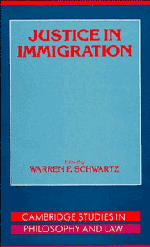Book contents
- Frontmatter
- Contents
- List of contributors
- 1 Immigration, welfare, and justice
- 2 Citizenship, the demands of justice, and the moral relevance of political borders
- 3 A two-country parable
- 4 Immigration, identity, and justice
- 5 Immigration, justice, and culture
- 6 Fear and loathing at the border
- 7 Immigration policy in liberal political theory
- 8 The welfare economics of immigration law: a theoretical survey with an analysis of U.S. policy
- 9 Just borders: normative economics and immigration law
- 10 Some caveats on the welfare economics of immigration law
- 11 The case for a liberal immigration policy
11 - The case for a liberal immigration policy
Published online by Cambridge University Press: 18 March 2010
- Frontmatter
- Contents
- List of contributors
- 1 Immigration, welfare, and justice
- 2 Citizenship, the demands of justice, and the moral relevance of political borders
- 3 A two-country parable
- 4 Immigration, identity, and justice
- 5 Immigration, justice, and culture
- 6 Fear and loathing at the border
- 7 Immigration policy in liberal political theory
- 8 The welfare economics of immigration law: a theoretical survey with an analysis of U.S. policy
- 9 Just borders: normative economics and immigration law
- 10 Some caveats on the welfare economics of immigration law
- 11 The case for a liberal immigration policy
Summary
Introduction
Classical free-trade theory assumed that goods could often readily be traded across national borders but that the factors of production employed to produce those goods (land, capital, and labor) were fixed and immobile. In the contemporary world, largely due to technological changes, this has become dramatically untrue of capital, and much less true of labor. However, the frequent resistance to international mobility of goods is often greatly intensified in the case of the international mobility of people. Here we move from the domain of international trade policy to the domain of immigration policy.
This essay addresses a question that has confronted all individuals and groups of individuals who, throughout history, have chosen to live in a state of civil society with one another and for whom social, political, and economic relationships are integral to the self-definition of each individual in the community of which they are a part. How does one define and justify the conditions of membership in the community? In the context of the modern nation-state, this directs our attention primarily to the substance and procedures of our immigration policies: who may become citizens and who must remain strangers, for nations imply boundaries and boundaries at some point imply closure. Current intense public debates in Canada, the United States, and Western Europe over central features of domestic immigration policies reflect the deep conflicts that immigration issues have always provoked. As of the late 1980s, approximately 100 million people were resident outside their nations of current citizenship.
- Type
- Chapter
- Information
- Justice in Immigration , pp. 219 - 246Publisher: Cambridge University PressPrint publication year: 1995
- 7
- Cited by



